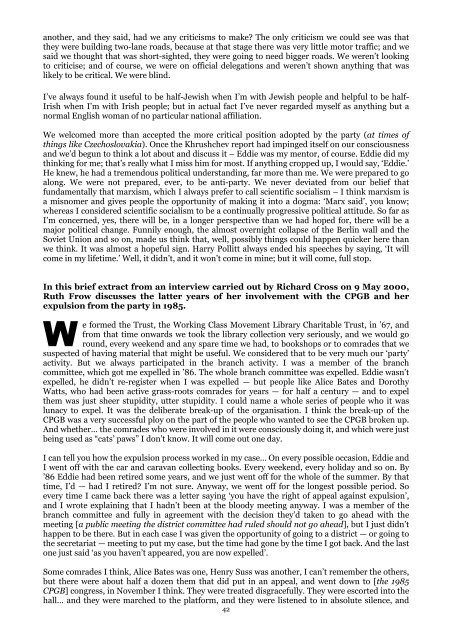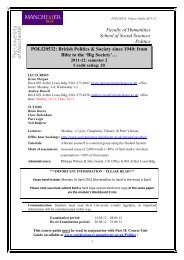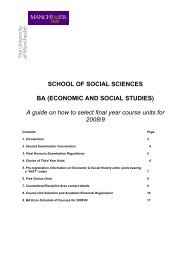CHNN 22, Spring 2008 - School of Social Sciences
CHNN 22, Spring 2008 - School of Social Sciences
CHNN 22, Spring 2008 - School of Social Sciences
Create successful ePaper yourself
Turn your PDF publications into a flip-book with our unique Google optimized e-Paper software.
another, and they said, had we any criticisms to make? The only criticism we could see was that<br />
they were building two-lane roads, because at that stage there was very little motor traffic; and we<br />
said we thought that was short-sighted, they were going to need bigger roads. We weren’t looking<br />
to criticise; and <strong>of</strong> course, we were on <strong>of</strong>ficial delegations and weren’t shown anything that was<br />
likely to be critical. We were blind.<br />
I’ve always found it useful to be half-Jewish when I’m with Jewish people and helpful to be half-<br />
Irish when I’m with Irish people; but in actual fact I’ve never regarded myself as anything but a<br />
normal English woman <strong>of</strong> no particular national affiliation.<br />
We welcomed more than accepted the more critical position adopted by the party (at times <strong>of</strong><br />
things like Czechoslovakia). Once the Khrushchev report had impinged itself on our consciousness<br />
and we’d begun to think a lot about and discuss it – Eddie was my mentor, <strong>of</strong> course. Eddie did my<br />
thinking for me; that’s really what I miss him for most. If anything cropped up, I would say, ‘Eddie.’<br />
He knew, he had a tremendous political understanding, far more than me. We were prepared to go<br />
along. We were not prepared, ever, to be anti-party. We never deviated from our belief that<br />
fundamentally that marxism, which I always prefer to call scientific socialism – I think marxism is<br />
a misnomer and gives people the opportunity <strong>of</strong> making it into a dogma: ‘Marx said’, you know;<br />
whereas I considered scientific socialism to be a continually progressive political attitude. So far as<br />
I’m concerned, yes, there will be, in a longer perspective than we had hoped for, there will be a<br />
major political change. Funnily enough, the almost overnight collapse <strong>of</strong> the Berlin wall and the<br />
Soviet Union and so on, made us think that, well, possibly things could happen quicker here than<br />
we think. It was almost a hopeful sign. Harry Pollitt always ended his speeches by saying, ‘It will<br />
come in my lifetime.’ Well, it didn’t, and it won’t come in mine; but it will come, full stop.<br />
In this brief extract from an interview carried out by Richard Cross on 9 May 2000,<br />
Ruth Frow discusses the latter years <strong>of</strong> her involvement with the CPGB and her<br />
expulsion from the party in 1985.<br />
W<br />
e formed the Trust, the Working Class Movement Library Charitable Trust, in ’67, and<br />
from that time onwards we took the library collection very seriously, and we would go<br />
round, every weekend and any spare time we had, to bookshops or to comrades that we<br />
suspected <strong>of</strong> having material that might be useful. We considered that to be very much our ‘party’<br />
activity. But we always participated in the branch activity. I was a member <strong>of</strong> the branch<br />
committee, which got me expelled in ’86. The whole branch committee was expelled. Eddie wasn’t<br />
expelled, he didn’t re-register when I was expelled — but people like Alice Bates and Dorothy<br />
Watts, who had been active grass-roots comrades for years — for half a century — and to expel<br />
them was just sheer stupidity, utter stupidity. I could name a whole series <strong>of</strong> people who it was<br />
lunacy to expel. It was the deliberate break-up <strong>of</strong> the organisation. I think the break-up <strong>of</strong> the<br />
CPGB was a very successful ploy on the part <strong>of</strong> the people who wanted to see the CPGB broken up.<br />
And whether… the comrades who were involved in it were consciously doing it, and which were just<br />
being used as “cats’ paws” I don’t know. It will come out one day.<br />
I can tell you how the expulsion process worked in my case… On every possible occasion, Eddie and<br />
I went <strong>of</strong>f with the car and caravan collecting books. Every weekend, every holiday and so on. By<br />
’86 Eddie had been retired some years, and we just went <strong>of</strong>f for the whole <strong>of</strong> the summer. By that<br />
time, I’d — had I retired? I’m not sure. Anyway, we went <strong>of</strong>f for the longest possible period. So<br />
every time I came back there was a letter saying ‘you have the right <strong>of</strong> appeal against expulsion’,<br />
and I wrote explaining that I hadn’t been at the bloody meeting anyway. I was a member <strong>of</strong> the<br />
branch committee and fully in agreement with the decision they’d taken to go ahead with the<br />
meeting [a public meeting the district committee had ruled should not go ahead], but I just didn’t<br />
happen to be there. But in each case I was given the opportunity <strong>of</strong> going to a district — or going to<br />
the secretariat — meeting to put my case, but the time had gone by the time I got back. And the last<br />
one just said ‘as you haven’t appeared, you are now expelled’.<br />
Some comrades I think, Alice Bates was one, Henry Suss was another, I can’t remember the others,<br />
but there were about half a dozen them that did put in an appeal, and went down to [the 1985<br />
CPGB] congress, in November I think. They were treated disgracefully. They were escorted into the<br />
hall… and they were marched to the platform, and they were listened to in absolute silence, and<br />
42
















